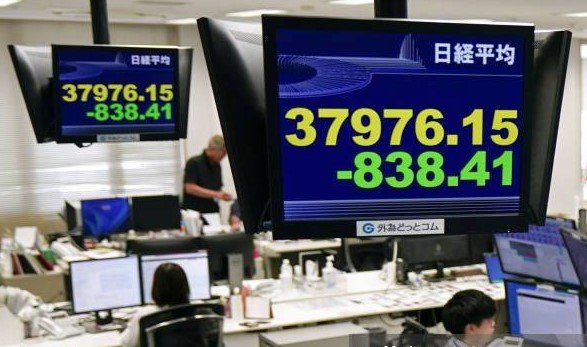Nikkei surges 5.5%, Kospi climbs 2.3%, but Hong Kong, Indonesia reel from tariff fallout
Asia’s major stock markets fought their way back into the green on Tuesday morning, showing surprising resilience in the face of escalating U.S.-China trade tensions. The sharp rebound followed one of the worst global sell-offs in recent memory—fueled by U.S. President Donald Trump’s latest tariff threats.
Japan Leads the Fightback
In Tokyo, the Nikkei 225 roared back with a 5.5% gain, closing at 32,819.08, clawing back much of Monday’s near 8% loss. This was one of the index’s strongest single-day rallies in over a year.
South Korea’s Kospi also surged, rising 2.3%, as tech-heavy stocks bounced back from oversold levels.
Australia and New Zealand joined the regional rally, buoyed by stabilizing futures for U.S. benchmarks, including the S&P 500 and Nasdaq 100, which were both up over 1% in early Asia trading.

China Staggers, Hong Kong Futures Dip
However, the recovery was uneven. Chinese equities remained under pressure after Trump threatened to slap an additional 50% tariff on Chinese imports—on top of the sweeping 20% tariffs announced earlier.
A U.S.-listed index of Chinese shares plunged more than 5% overnight, dragging Hong Kong futures into negative territory. Chinese sovereign bond yields flirted with record lows as investors moved to safer assets, bracing for a prolonged economic standoff between Washington and Beijing.
Indonesia: A Delayed Panic
Indonesian markets had been closed since March 27 for an extended holiday. When they reopened Tuesday, they walked straight into the fire.
The Jakarta Composite Index tumbled 9.2%, triggering a 30-minute trading halt. The sharp drop reflected pent-up panic selling in response to global volatility and the expanding U.S.-China tariff war.
A Deepening Divide
The morning’s movements suggest a split in investor sentiment across Asia:
-
Japan and South Korea appear to be in recovery mode, boosted by domestic buying and hopes of a softer U.S. stance toward key allies.
-
China, Hong Kong, and Indonesia, on the other hand, are still absorbing the shock of being squarely in Trump’s crosshairs.
The Bigger Picture
Markets may have rebounded on Tuesday, but analysts warn the volatility is far from over.
“We’ve entered a new phase of the trade war—one that feels far more personal and targeted,” said a Singapore-based equity strategist. “There will be whiplash.”
With U.S. Treasury yields and the dollar staying stable, investors are hedging their bets on whether Trump’s tariff blitz will trigger coordinated responses from global central banks.
For now, Asia’s bulls are back—but they’re still glancing over their shoulders.
